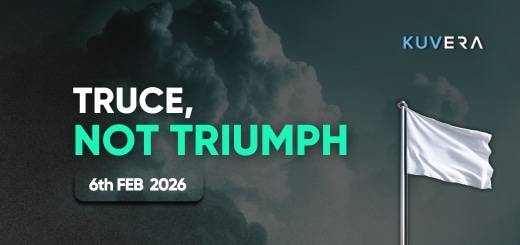In this edition, we talk about Indian auto companies targeting the premium segment. We also talk about why the finance ministry remains bullish on the economy and the launch of Meta Threads that has riled Twitter boss Elon Musk.
Welcome to Kuvera’s weekly digest on the most critical developments related to business, finance, and the markets.
tl;dr Hear the article in brief instead?

December 14, 1983 changed the face of India’s automotive industry. That day, Maruti 800, India’s first ‘people’s car’, was born. The car’s most basic version, which lacked ‘luxuries’ like air-conditioning (yes, an AC was still a big deal in the 1980s), was priced at just Rs 47,500, bringing it well within the reach of millions of families. The car was a runaway success, and the rest is history.
Less than a decade later, India liberalised its economy. In its wake was created a class of the nouveau riche, who desired more than just the luxury of a car AC.
Four decades on, Maruti Suzuki is leading a pack of automakers that are now looking to cater to this class of India’s new rich and go upmarket as a growing number of buyers opt for bigger, feature-packed cars.
This week, the automaker launched Invicto, its more expensive car yet, with the base variant priced at Rs 24.75 lakh. Maruti says the multi-purpose vehicle offers cutting-edge technologies including a power tailgate that opens with a single touch, Suzuki Connect’s newest version, six airbags, a 10-inch infotainment system, and a panoramic sunroof.
The company aims to raise its brand image and enter a segment where it sees rapid growth as the purchasing power of Indian car buyers increases. Hisahi Takeuchi, the company’s MD and CEO, claimed that in the first quarter of this fiscal year, Maruti Suzuki increased its market share in the SUV class from 8.6% to 20%. Overall, India’s largest automaker by volume sold 133,027 passenger vehicles at home in June, an increase of 8.5% year over year.
Maruti has good reason to move away from the lower segment and towards a luxury offering. Post-COVID, more Indians are splurging on bigger, fancier cars with touchscreen displays and sunroofs, driving up sales of sport-utility vehicles (SUVs) and MPVs that have nearly doubled over the last five years. Meanwhile, the share of small and compact cars priced below Rs 10 lakh slipped to 60% of India’s total car sales last fiscal year, from 85% in 2018-19.
The Invicto launch made another impact. It propelled Maruti’s stock to a lifetime high above Rs 10,000 apiece this week, pushing its market value above Rs 3 trillion. Clearly, even investors think that Maruti is on the right track.
Ride on

Maruti is not the only automaker trying to cater to this elite segment. Just a day before the carmaker came up with its latest offering, two-wheeler maker Hero MotoCorp launched Harley Davidson’s lowest priced model, the X440, which will be sold from 300 outlets owned by the Munjal family-owned Indian company.
At a starting price of just Rs 2.29 lakh, the new bike is the most affordable Harley yet, one that thousands of aspirational Indian buyers will be able to afford. Hero will sell Harley alongside its own premium bikes like the Xtreme, the Xpulse, Vida electric scooters and the upcoming Karizma.
Just two days after Hero rolled out the ‘Harley-lite’, Bajaj Auto introduced two locally made Triumph motorcycles. The Triumph Speed 400 will be priced at Rs 2.33 lakh but the price for the Scrambler 400X hasn’t been disclosed yet.
The launch of the two models, made in partnership with the UK’s Triumph Motorcycles, sent Bajaj Auto shares to a record high of Rs 4,900. Hero wasn’t far behind; its shares touched a new high above Rs 3,200 apiece.
While investors in Bajaj and Hero cheered the new bikes, those riding on Eicher Motors seemed a tad worried. Shares of Eicher, the maker of the Classic 350 and Meteor range of heavy-duty bikes, slipped almost 12% this week.
Getting back to the point, like carmakers, two-wheeler manufacturers have also been shifting their focus to more premium offerings that cater to an aspiring urban population. This is because demand in rural India, which accounts for a majority of two-wheeler sales, has been muted due to high inflation and economic slowdown.
And this is what should make automakers a worried lot. According to the Federation of Automobile Dealers Association, retail vehicle sales in June were 3% lower than pre-Covid levels, with two-wheeler sales down 14%.
Rising Tide Lifts All
Automakers aren’t the only ones in the fast lane. The Indian economy, too, appears poised to sustain its growth in a more durable way than before, the finance ministry said this week in its Annual Economic Review for 2022-23.
The ministry said a strong final quarter (January-March) performance in FY23 pushed the GDP growth for the full year to 7.2%, higher than the 7% estimated in February. “This upside to the growth estimate takes the growth momentum deep into the current year,” it said.
The ministry also said that investments in supply-side infrastructure raise the possibility that India can enjoy sustained economic growth longer than it has been able to in several decades. “If we are patient, the rising tide will lift all boats as it has begun to,” it said.
The report noted that high-frequency indicators paint a healthy picture of the state of the economy. “Urban demand conditions remain resilient, with higher growth in auto sales, fuel consumption and UPI transactions. Rural demand is also on its path to recovery with robust growth in two and three-wheeler sales. While the GST collections and Purchasing Managers’ Index for the manufacturing and services sector continue to expand, a surge in services exports and increase in remittances has helped narrow the current account deficit towards the end of FY23,” it added.
However, the report cautioned that escalation of geopolitical stress, enhanced volatility in global financial systems, any sharp correction in global stock markets, a high magnitude of El-Nino impact, modest trade activity and FDI inflows could constrain the pace of growth. “Should these developments deepen and dampen growth in the subsequent quarters, the external sector may challenge India’s growth outlook for FY24,” the ministry said.
Unroll the Threads
The biggest news in the technology world this week was the launch of Threads by Meta, led by billionaire Mark Zuckerberg, and how it riled Twitter’s billionaire boss Elon Musk.
Meta, the parent of Facebook, Instagram and WhatsApp, unveiled a new social networking app called Threads on Thursday. Within hours, the app—which leverages Instagram’s billions of users—signed up over 30 million users.

What exactly is Threads and why did it annoy Musk? Threads is essentially a text-based messaging app, though users can also post videos and photos. The problem is it looks very similar to the microblogging platform Twitter.
Just like Twitter, users on Threads can also post messages—albeit with a 500-character limit. Users can also reply to, repost and quote others’ Threads posts.
“The vision for Threads is to create an option and friendly public space for conversation,” Meta CEO Mark Zuckerberg said in a Threads post following the launch.
But Musk, which bought Twitter last year, wasn’t impressed. Twitter has accused Meta of stealing trade secrets by hiring its former employees. And Musk himself tweeted: “Competition is fine, cheating is not.”
Threads is not the only one or the first one challenging Twitter. The social network Mastodon and Bluesky, backed by former Twitter CEO Jack Dorsey, are among the others.
So, will Threads turn out to be the ‘Twitter killer’? Well, it’s too early to say that. But even without Threads, Twitter has been in turmoil ever since Musk’s $44 billion takeover and has fired thousands of employees. And yes, don’t forget to follow us on Threads here.
Market Wrap
The Indian stock markets, it seems, are unstoppable. Sensex and Nifty, the two benchmark indices have been defying global trends to make record closing levels.
The 30-share Sensex and the 50-stock Nifty fell about 0.8% on Friday but still managed to clock a gain of almost 0.9% and 0.7%, respectively, for the week.
Meanwhile, the week also saw shares of drone maker ideaForge Technologies list at a 93.5% premium to the issue price, giving its retail investors handsome listing gains. The stock listed at Rs 1,300 per share on the NSE as against the IPO price of Rs 672 apiece.
Auto stocks led the Nifty pack. Mahindra & Mahindra jumped 13%, Hero MotoCorp soared 11% during the week. Maruti Suzuki and Tata Motors were up nearly 4%.
State-run refiners Indian Oil Corp and Bharat Petroleum were also among the top gainers during the week.
These stocks were closely followed by Yes Bank and the Bajaj twins—Bajaj Finance and Bajaj Finserv—and by the likes of GAIL India, Titan, Tech Mahindra, ITC, Reliance Industries and a bunch of state-owned firms ONGC, NTPC, Power Grid Corp and State Bank of India.
The counters that ended in the red were Eicher Motors, Adani Ports, UPL, HDFC Bank and Bharti Airtel.
Other headlines
- Adani Green to raise Rs 12,300 crore via QIP to fund expansion
- Titan revenue grows 20% in Q1 FY24 on strong performance in key businesses
- Tata Group may postpone Tata Play IPO as company slips into net loss of Rs 105 crore
- NCLT approves demerger of financial services unit of Reliance Industries
- SIAC orders Pratt & Whitney to give GoFirst five engines every month
- Byju’s to form a Board Advisory Committee to guide CEO on governance
- Indian Oil in talks with Tamil Nadu, Kerala governments for setting up green hydrogen units
- Dabur expects India business to post high single-digit growth in Q1
- TRAI to start consultation on regulation of over-the-top platforms
- Govt calls off disinvestment of helicopter firm Pawan Hans
- Tomato price further shoots up to Rs 162/kg
- Monsoon deficit likely to get wiped off soon, but El Nino a concern
- Govt okays draft notification for mandating air-conditioned truck cabins.
That’s all for this week. Until next week, happy investing!
Interested in how we think about the markets? Read more: Zen And The Art Of Investing
Watch here: Investing in Flexi cap funds
Start investing through a platform that brings goal planning and investing to your fingertips. Visit kuvera.in to discover Direct Plans and Fixed Deposits and start investing today.











